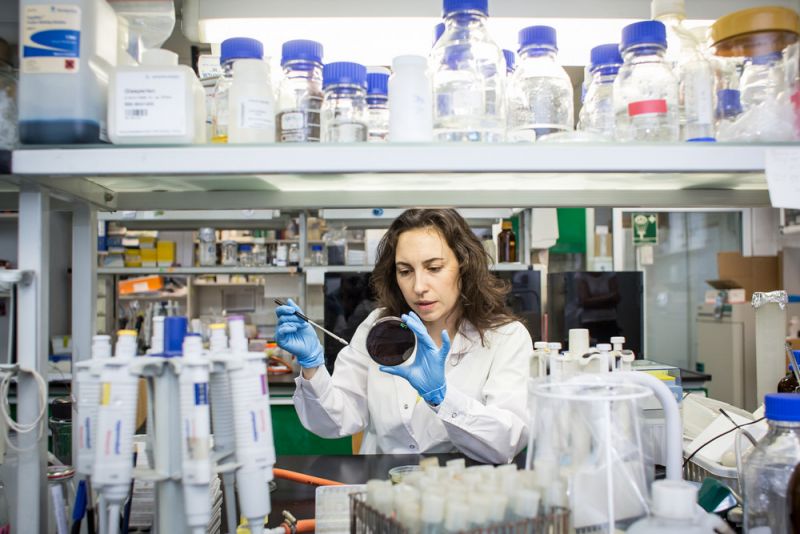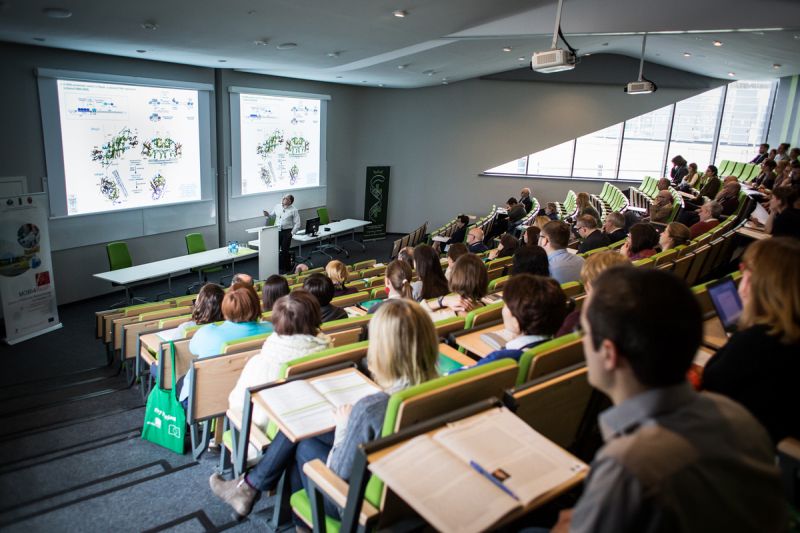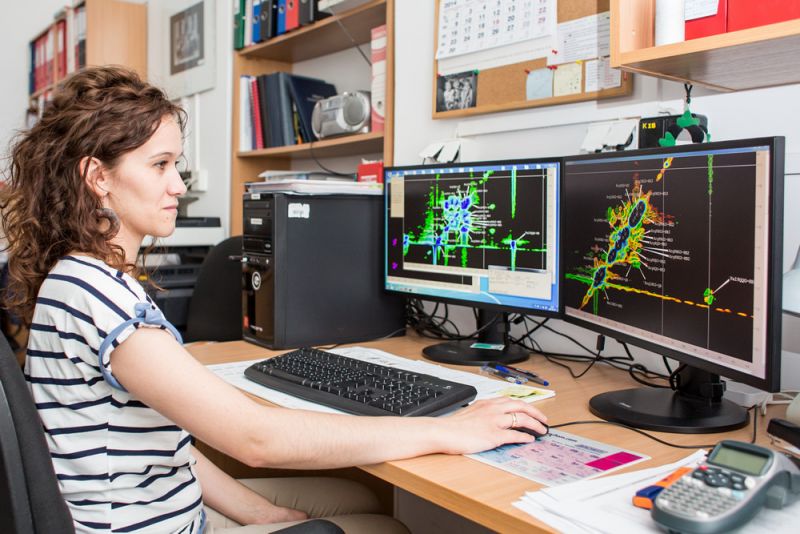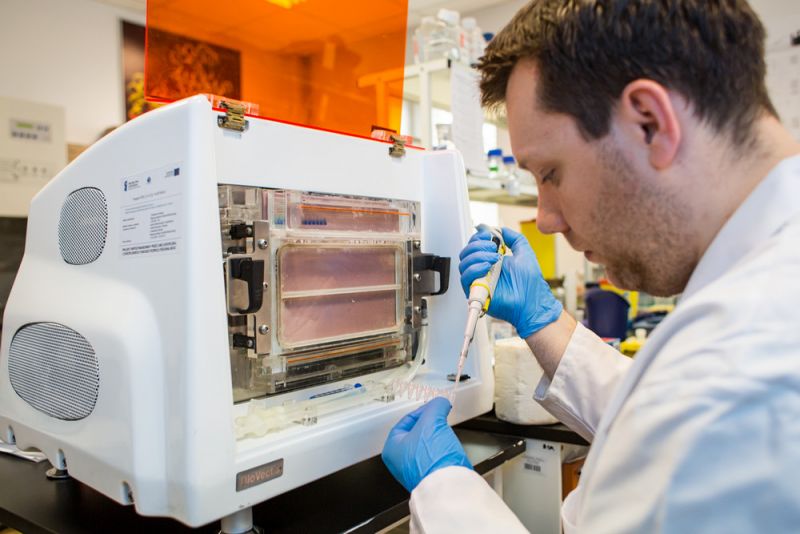Study at IFB
STUDIES AT IFB
Based on a modern learning course programme which allows students to rapidly become involved in research, three stages of full-time study are available.
Take a look at our range of studies:
- first stage (3 year bachelor’s degree)
- second stage (2 year master’s degree)
- third stage (4 year doctoral studies)
-> recruitment topics
RECRUITMENT:
The Intercollegiate Faculty of Biotechnology at the University of Gdansk and the Medical University Of Gdańsk (IFB UG&MUG) is a nationally unique inter-university scientific and didactic body created by two universities. This allows the institution to make use of the infrastructure and staff experience from two universities. It also permits the combination of international scientific research standards with the highest quality of education. The research and teaching are interdisciplinary and combine biomedical and bio-molecular issues and their applications in biotechnology for health and life quality.


The educational process conducted by IFB UG&MUG in the subject of BIOTECHNOLOGY has been accredited by the Polish Accreditation Commission.
Studies at the Faculty work by a system of credits, in accordance with the European Credit Transfer System (ECTS). This allows students to individually shape their study profile. Students also have the opportunity to realise their programme of education at other partnering institutions, including abroad at, among others: the University of Bremen, Uniwersytet degli Studi di Perugia, the University of Glasgow, the University of Bradford, the University of Chicago and the University of Houston Downtown. International student exchanges take place both as part of the Erasmus programme and within the framework of cooperative agreements established by the Faculty. In order to expand their knowledge, IFB students can take advantage of other faculties at the University of Gdansk and the Medical University of Gdansk, as well as of intercollegiate bodies.
Thanks to compulsory internships, students have the chance to become acquainted with practical aspects of the functioning of various workplaces and laboratories. Students can carry out their own research projects through the student Scientific Circle BIO-MED, which is also actively involved in the organisation of events for the dissemination of science – The Baltic Festival of Science and the Night of the Biologists. In addition to the standard teaching, every year the Faculty organizes Summer Schools of Biotechnology. These are open air biotechnology meetings, during which outstanding speakers from Poland and abroad give lectures.
Graduates acquire interdisciplinary knowledge and skills from the life sciences and medicine which are relevant to the profession of biotechnology, and which are essential for their future professional life. During their studies, they gain general knowledge allowing them to describe and explain processes and phenomena occurring in nature, including especially in the human organism, everyday life and in basic biotechnological processes. They also gain expertise regarding the issues of modern molecular biotechnology, including especially those used in the diagnosis and therapy of human, animal and plant diseases. Some classes are taught in English, which greatly increases the value of graduates in the eyes of employers.
Graduates of IFB UG&MUG are prepared for work in:
- research and development centres
- selected branches of industry
- public sector services
They are employed in leading scientific centres at home and abroad (Karolinska Institut, Harvard University, Cambridge, Royal College, MIBMiK, Institutes of the Polish Academy of Sciences) and in life-science companies (Procter & Gamble, Novartis, Crucell, Polpharma).
Meet our RESEARCH GROUPS
Join us today!
Like us on Facebook :-)
Biotechnology – studies with a future
Awards
The subject BIOTECHNOLOGY at the Intercollegiate Faculty of Biotechnology was awarded the title BEST FIELD OF STUDY by the Ministry of Science and Higher Education, and the education programme for first and second stage studies received a DISTINCTION from the Polish Accreditation Commission.
The Faculty also received funding for the best study programmes based on the National Qualifications Framework and for adapting studies to the requirements of the labour market. The General Council for Science and Higher Education recognised the set of learning outcomes prepared by the Faculty for first stage studies in biotechnology as exemplary.
In the Scientific Units Evaluation Committee’s assessment of scientific and research activities, the Intercollegiate Faculty of Biotechnology received the highest possible A+ rating, which means that it has been recognised for the quality of its research and development.
Modern infrastructure
In 2012 the University of Gdansk signed a contract for the building of a new Biotechnology Institute building, situated at 58 Abraham Street on the Oliwa campus. The total value of the investment came to almost PLN 60 million. The building has modern teaching facilities for undergraduates and postgraduates including teaching laboratories, scientific-didactic laboratories, seminar rooms, computer rooms, an auditorium for 180 people, and specialised laboratories for development research.
The Faculty has also received large investment grants for creating new and retrofitting existing laboratories, such as the grant for the establishment of a mass spectrometry laboratory as part of the MOBI4Health Centre of Molecular Biotechnology for Healthy Life project. This was implemented as part of 7PR. REGPOT, a grant for the setting up of the Genetic and Biomolecular Analysis Laboratory (MNiSW). Similarly, the Faculty received a grant for preparing a fluorescent confocal microscopy laboratory (FNiTP).
This development of modern research facilities makes possible advanced research and extensive international scientific cooperation.
There has been a noticeable increase in investment aimed at the development and expansion of biotechnology companies, where the demand for graduates in this field is increasing. Therefore, the Faculty plans to further develop by establishing new research teams and extending the common infrastructure for ongoing research.



Innovative research projects
Every year Faculty employees conduct several dozen research projects. These projects are carried out as part of EU Framework Programmes, FNP projects, MNiSW and NCBiR projects, NCN programmes or international COST programmes.
IFB Projects
Academic Staff
Every year, the Faculty’s academic staff, thanks to the high level of their work, receive many prestigious grants, prizes and distinctions. Their work is published in distinguished international scientific journals.





.JPG)